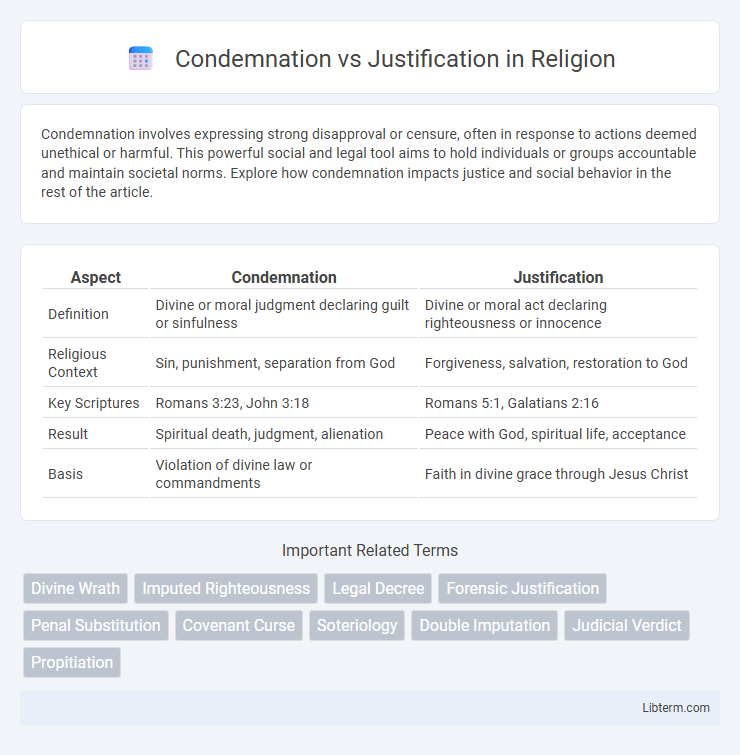Condemnation involves expressing strong disapproval or censure, often in response to actions deemed unethical or harmful. This powerful social and legal tool aims to hold individuals or groups accountable and maintain societal norms. Explore how condemnation impacts justice and social behavior in the rest of the article.
Table of Comparison
| Aspect | Condemnation | Justification |
|---|---|---|
| Definition | Divine or moral judgment declaring guilt or sinfulness | Divine or moral act declaring righteousness or innocence |
| Religious Context | Sin, punishment, separation from God | Forgiveness, salvation, restoration to God |
| Key Scriptures | Romans 3:23, John 3:18 | Romans 5:1, Galatians 2:16 |
| Result | Spiritual death, judgment, alienation | Peace with God, spiritual life, acceptance |
| Basis | Violation of divine law or commandments | Faith in divine grace through Jesus Christ |
Understanding Condemnation and Justification
Condemnation involves the judgment that someone is guilty or deserving of punishment, often linked to feelings of guilt, shame, and alienation, whereas justification is the act of declaring someone righteous or free from blame based on evidence, merit, or legal grounds. Understanding condemnation requires recognizing its impact on personal or social identity, reinforcing negative perceptions and limiting growth, while justification fosters acceptance, validation, and restoration of integrity. Key legal and psychological frameworks emphasize the contrasting roles of condemnation and justification in shaping human behavior and societal norms.
Definitions: Condemnation vs Justification
Condemnation refers to the act of expressing strong disapproval or declaring someone guilty of wrongdoing, often resulting in punishment or social stigma. Justification is the process of providing valid reasons or evidence to defend or excuse an action, proving it to be right or acceptable under specific circumstances. The key difference lies in condemnation blaming and punishing, while justification exonerates and legitimizes behavior.
The Psychological Impact of Condemnation
Condemnation often triggers intense feelings of shame, guilt, and lowered self-esteem, significantly impacting mental health and emotional well-being. The psychological burden from persistent condemnation can lead to anxiety, depression, and a diminished sense of personal worth, hindering motivation and resilience. Understanding this impact is crucial for developing compassionate approaches that foster justification, healing, and positive behavioral change.
The Role of Justification in Moral Judgments
Justification plays a critical role in moral judgments by providing a reasoned basis for actions that might otherwise be condemned. It involves evaluating circumstances, intentions, and outcomes to determine whether an individual's behavior aligns with ethical principles. The presence of justification often shifts moral assessment from outright condemnation to understanding and acceptance, highlighting the complexity of ethical decision-making.
Historical Perspectives on Condemnation and Justification
Historical perspectives on condemnation reveal its roots in religious, legal, and moral traditions where wrongdoing was met with punishment or social exclusion to maintain order and authority. Justification evolved alongside, particularly in theological and legal contexts, to explain or defend actions deemed morally or legally acceptable, often serving to reconcile individuals with societal or divine standards. These contrasting frameworks shaped societal norms by balancing the enforcement of rules with the acknowledgment of mitigating circumstances and moral complexity.
Condemnation vs Justification in Law and Ethics
Condemnation in law often refers to the formal declaration of guilt or blame, typically resulting in punishment or penalties, while justification provides a lawful defense excusing an act otherwise deemed illegal or unethical. In ethics, condemnation signals moral disapproval of actions violating societal norms, whereas justification involves rationalizing behavior as morally acceptable based on principles such as intent or circumstance. The distinction between condemnation and justification is central to legal responsibility and ethical accountability, influencing judgments in courts and moral evaluations alike.
Religious Views: Condemnation and Justification
Condemnation in religious views often signifies divine judgment against sin, highlighting human fallibility and the need for redemption through repentance. Justification, especially emphasized in Christian theology, refers to the act whereby God declares a sinner righteous based on faith in Jesus Christ, symbolizing spiritual cleansing and acceptance. These concepts underscore the transformative process from guilt to grace, central to many religious doctrines.
The Effects on Personal Relationships
Condemnation damages personal relationships by fostering resentment, mistrust, and emotional distance, often leading to conflict and breakdowns in communication. Justification promotes understanding and forgiveness, encouraging open dialogue and strengthening emotional bonds through empathy and validation. Choosing justification over condemnation creates a supportive environment conducive to healing and relationship growth.
Condemnation and Justification in Social Media
Condemnation on social media often results in public shaming, increased polarization, and a toxic environment where nuanced discussions are overshadowed by quick judgments. Justification, in contrast, promotes understanding by explaining motives and contexts behind actions, fostering empathy and constructive dialogue among users. The dynamics between condemnation and justification significantly influence online community health and the spread of misinformation.
Finding Balance: Moving Beyond Condemnation or Justification
Finding balance between condemnation and justification requires recognizing the limitations of harsh judgment and uncritical acceptance. Embracing nuanced perspectives fosters empathy and accountability, encouraging constructive dialogue and personal growth. Prioritizing understanding over blame or defense drives healthier relationships and more effective conflict resolution.
Condemnation Infographic

 libterm.com
libterm.com